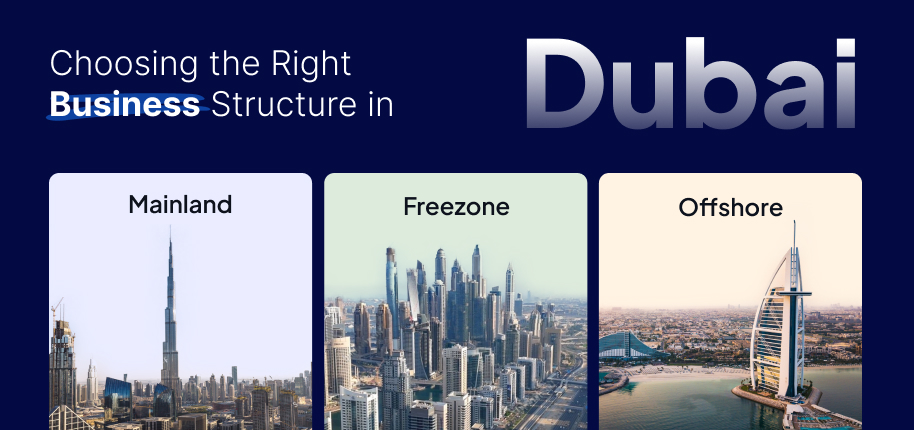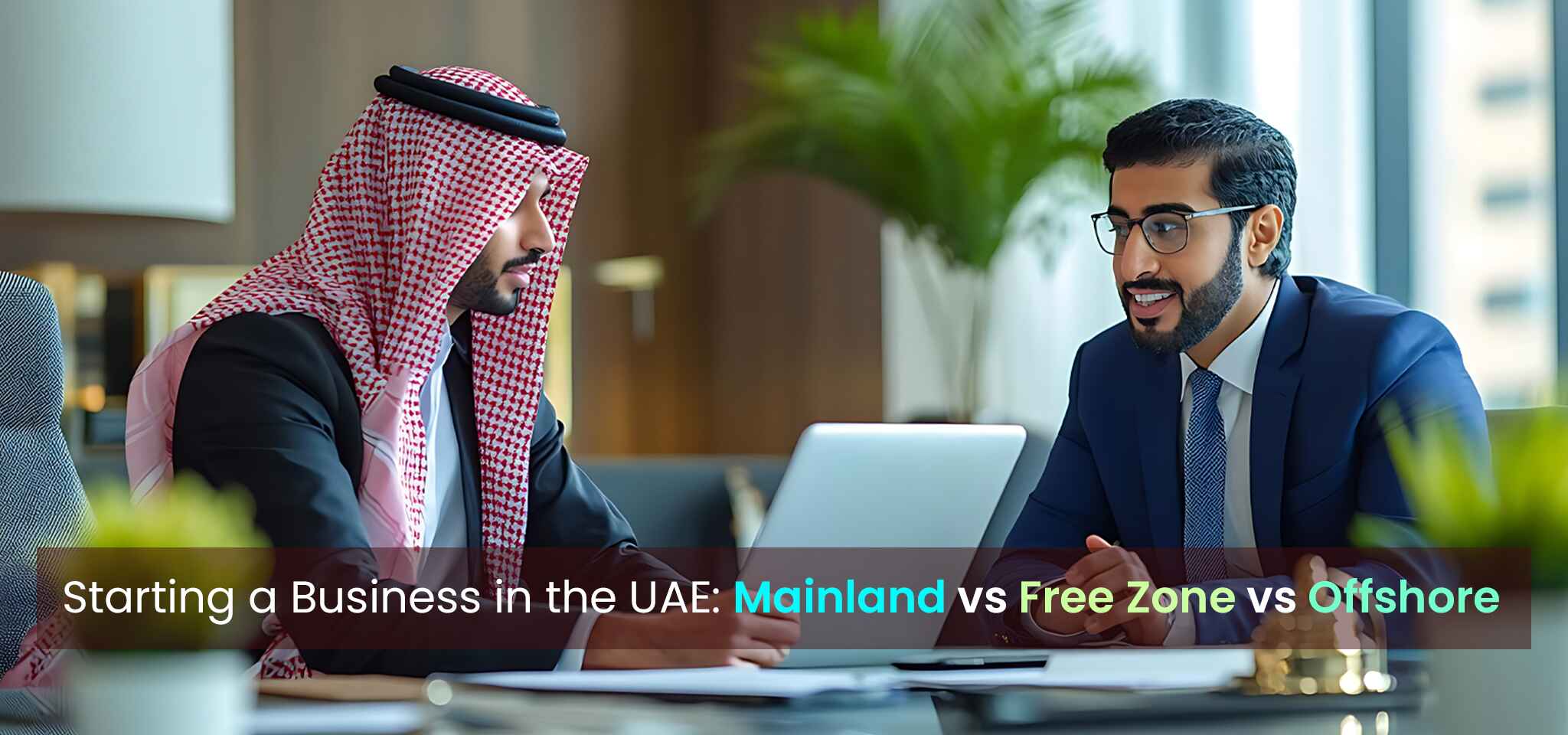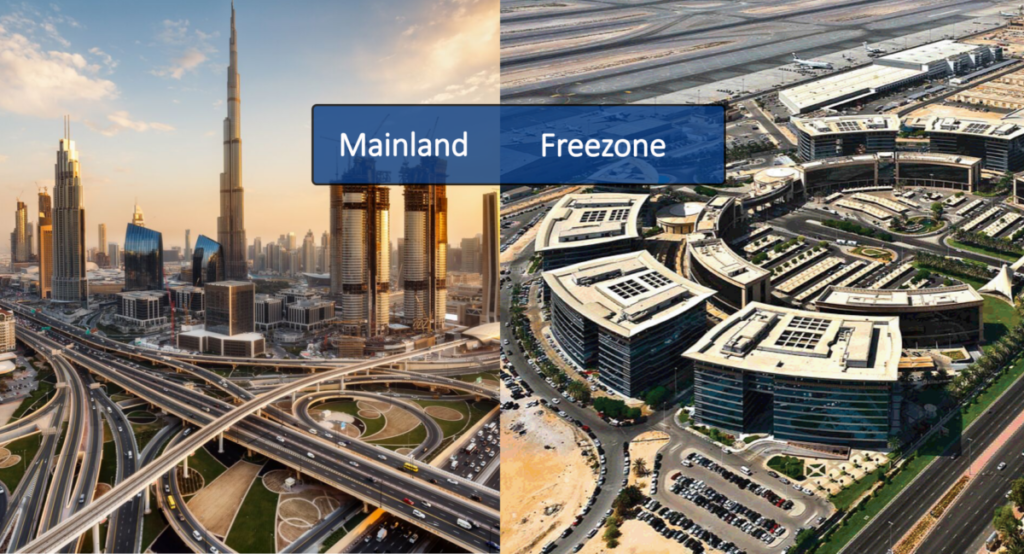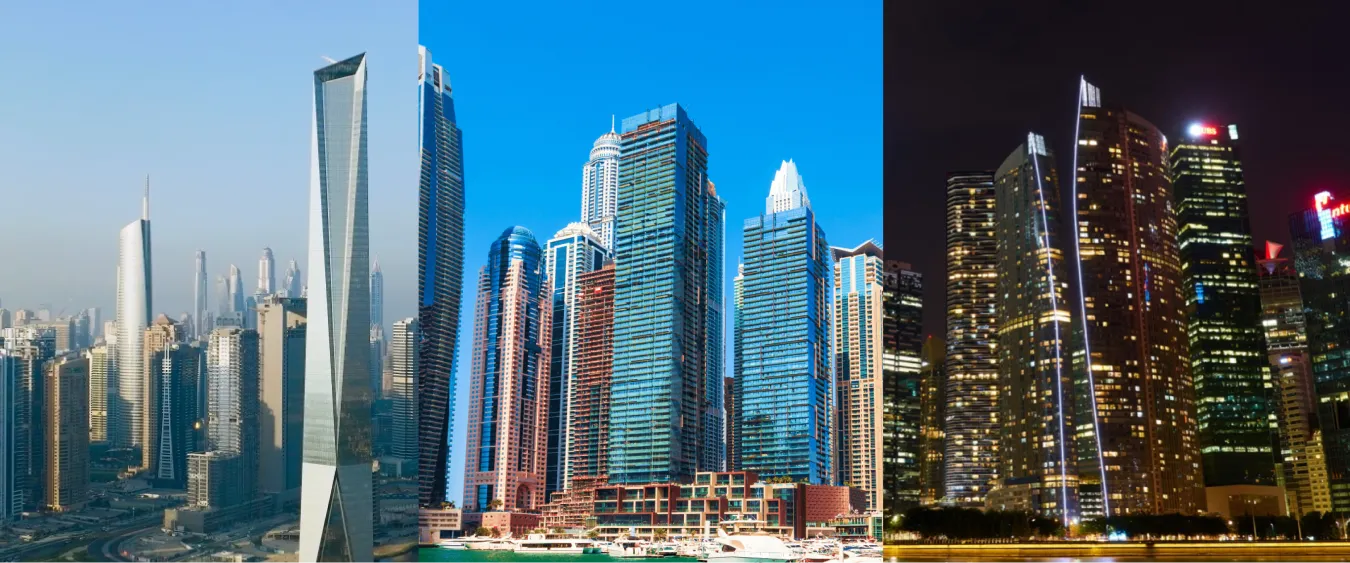A Practical Guide to UAE Entity Structures, Free Zone vs Mainland vs Offshore Explained

Introduction
Every business owner who enters Dubai arrives with a dream. Some want global reach. Others want a presence in the UAE’s fast-growing market. The first major decision they face shapes their entire expansion journey. They must choose between a Free Zone vs Mainland vs Offshore company structure.
This decision is not simply a licensing formality. It influences:
• Market access
• Ownership rights
• Tax efficiency
• Investment flexibility
• Operational cost and compliance
To make this real, let’s follow the journey of Sara, a global entrepreneur stepping into Dubai’s competitive business arena. Her story will help you see how the right corporate structure does more than establish a business. It creates freedom. It unlocks opportunity. It sets the foundation for success.
The Story Begins: Sara Comes to Dubai
Sara is a talented digital marketing consultant from Europe. Her life has always revolved around serving clients across different time zones. As her business grew, she wanted a secure, tax-efficient base that offered international mobility and prestige. All roads led to Dubai.
She loved the idea of 100 percent foreign ownership, access to global markets, minimal bureaucracy, and a stable, business-first government. Yet the first challenge came quickly.
The question that decides everything:
Which setup aligns with her goals, Free Zone vs Mainland vs Offshore?
She realized this choice would affect:
• How she invoices clients
• Whether she could sell in the UAE market
• Visa and staffing decisions
• Initial and long-term costs
So she did what every smart entrepreneur does. She researched everything.
Sara’s Exploration of the Three UAE Business Structures
What is a Free Zone company?
Sara discovered that a Free Zone company is set up inside a regulated zone designed to support foreign investment. It offers:
• Full foreign ownership
• High cost-efficiency in the early stages
• Repatriation of profits without restrictions
• Business-friendly tax benefits
• Streamlined business setup
• Flexibility in visas and office space
• Ideal for businesses selling internationally
However, Free Zone companies cannot sell directly into the UAE mainland without a local partner or additional approvals. This limitation created a question mark for Sara’s plans.
What is a Mainland company?
A Mainland company is registered directly under the UAE government. It provides:
• Freedom to operate anywhere in the UAE
• Ability to work with government and large local clients
• Full market access, including retail or on-the-ground services
• Eligibility for physical branches, real offices, and staff growth
Although many business activities now allow full foreign ownership, some still require Emirati involvement.
Mainland companies usually come with higher:
• Setup and rent costs
• Compliance obligations
• Operational expenses
This made Sara consider when and how she planned to scale.
What is an Offshore company?
The Offshore structure intrigued her because it offered:
• Full foreign ownership
• Low operating costs and minimal reporting
• No office space requirement
• Ideal for holding assets, intellectual property, or global trade
However, Offshore companies are not permitted to trade or conduct operations inside the UAE domestic market. This made it unsuitable as her only structure since she planned to eventually expand into the region.
Bullet Comparison of Free Zone vs Mainland vs Offshore
Instead of a table, here is the same breakdown in clear bullet form.
Ownership
• Free Zone: 100 percent foreign ownership
• Mainland: 100 percent foreign ownership allowed for most activities
• Offshore: 100 percent foreign ownership
UAE Local Market Access
• Free Zone: Restricted access to the mainland unless through a distributor or a branch
• Mainland: Full access to UAE domestic and global markets
• Offshore: Not permitted to engage in UAE domestic trade
Tax and Customs
• Free Zone: Strong tax advantages in many zones
• Mainland: Corporate tax may apply depending on revenue
• Offshore: Highly tax-efficient for international operations
Office and Visas
• Free Zone: Flexible office options including shared or virtual desks
• Mainland: Physical office required with a visa quota tied to space
• Offshore: Physical office not required, limited visa options
Ideal Use Cases
• Free Zone: Service providers, e-commerce, global trade, tech startups
• Mainland: Retail, physical operations, government contracting
• Offshore: Wealth structuring, asset protection, international trading
Cost and Compliance
• Free Zone: Moderate costs and clear compliance
• Mainland: Higher costs and intensive regulation
• Offshore: Low ongoing cost and simple compliance
Which Option Did Sara Choose?
After comparing Free Zone vs Mainland vs Offshore, Sara looked at her core business needs:
• Her clients were global
• She wanted full control
• She wanted a quick and affordable setup
• Future flexibility mattered
A Free Zone setup was the clear winner for her start.
She also mapped her growth strategy:
Start Free Zone
Test the UAE market later
Set up a Mainland branch if needed
Choosing a UAE Free Zone did not lock her future. It empowered it.
What About You? Your Own “Sara Moment”
Use these questions to guide your decision:
• Who are your customers today?
If mostly global, a Free Zone or Offshore may fit. If mostly UAE-based, the Mainland is key.
• How soon do you want to sell inside the UAE?
Local trade requires a Mainland license or structured access.
• How large is your team initially?
Few remote staff favor the Free Zone. Retail or large staff requires the Mainland.
• Do you require prestige with local presence?
Mainland makes your business visible domestically.
• Are you holding assets and intellectual property?
Offshore structures can be beneficial.
• What is your investment appetite?
Mainland offers reach at a price. Free Zones offer efficiency with flexibility.
• Do you want the easiest compliance?
Offshore has the simplest admin, but limitations on trading locally.
Understanding Pros and Cons
Free Zone Pros
• Global freedom
• Attractive tax incentives
• Fast setup and low initial cost
• Full foreign ownership
• Perfect for digital and global business models
Free Zone Cons
• Restricted UAE mainland business operations
• Some license activities are limited to Free Zone boundaries
Mainland Pros
• Complete UAE business access
• Enables brick and mortar expansion
• Government contract eligibility
• Strong long-term market positioning
Mainland Cons
• Higher operational investment
• More regulatory procedures
• Office space required
Offshore Pros
• Very low operating requirements
• Ideal for international holding
• Confidentiality and asset control
Offshore Cons
• Cannot trade in the UAE
• Limited practical uses for operational businesses
Hybrid Strategies: You Can Have Both
Sara learned she could combine structures.
Examples:
• Set up a Free Zone company for operations and an Offshore company for IP and assets
• Begin Free Zone, then create a Mainland branch once local demand is proven
This flexibility is a major benefit of launching in the UAE. Your path is scalable, not fixed.
The Hidden Impact of the Right Choice
Choosing between Free Zone vs Mainland vs Offshore affects much more than paperwork. It shapes:
• Your branding and credibility
• Your cost efficiency at launch
• Your access to important clients
• Your legal and financial protection
• Your ability to raise capital and expand
The wrong choice does not mean failure, yet a strategic choice accelerates success.
Sara often reflects on her decision. She took time to evaluate her purpose, her market, and her growth timeline. That clarity helped her take confident steps into a new region without overspending or limiting her future potential.
That same clarity will move your business forward.
Final Thoughts
Every entrepreneur enters the UAE with a unique mission. There is no one-size-fits-all solution when choosing between Free Zone vs Mainland vs Offshore. The right answer depends on your:
• Business model
• Target clients
• Operational footprint
• Investment capability
• Long-term ambitions
Sara’s journey reminds us that the smartest decision is the one that matches your business strategy today, while still supporting your ambitions tomorrow.
Move with intention. Lay a strong foundation. Think global and plan local.
If you are shaping your future in the UAE market and want clarity tailored to your business, Cross-Border Tax & Business Advisor is ready to support you with expert guidance every step of the way.





